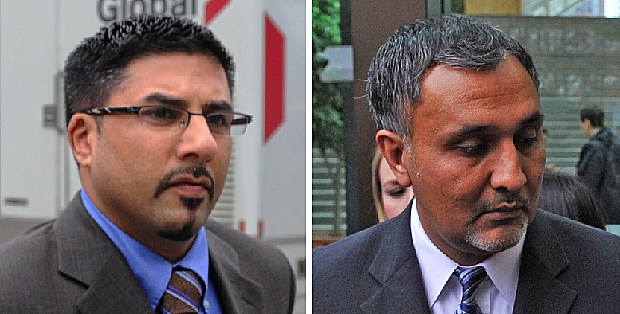Auditor general John Doyle’s quest for details of the B.C. Rail legal payout ran smack into the wall of solicitor-client privilege on Tuesday.
The wall is still standing. Whether Doyle’s audit into the controversial plea-bargain payout survived the crash remains to be seen.
B.C. Supreme Court Chief Justice Robert Bauman issued a 42-page judgment that makes several clear points en route to rejecting Doyle’s bid to examine whatever he wants.
The first is that solicitor-client privilege trumped all the other principles argued in the case.
Among other things, Doyle wanted unredacted invoices from the lawyers who defended former government aides Dave Basi and Bobby Virk and racked up $6 million in bills over the years before the pair changed their pleas to guilty.
He won’t be getting them, because they’re privileged. The judge said Doyle’s petition amounted to a “sweeping invasion of solicitor-client privilege.”
That privilege is “fundamental to the proper functioning of our legal system,” said the judgment. “It is virtually an absolute privilege and must remain so.”
Bauman said some view it as a shield that is obscuring matters that should be publicly aired.
But it’s not some lawyer’s trick; it’s a critical civil right.
“It would be wrong to conclude that the result of this case represents the triumph of secrecy over transparency and accountability,” said Bauman.
“It rather represents the reaffirmation of a principle which is a cornerstone value in our democracy and which has been so for hundreds of years.”
Although Doyle probably would have lost the case on that point alone, his arguments were undermined by the evidence of one of his predecessors.
Former auditor general Wayne Strelioff asserted that the wholesale access Doyle wanted wasn’t necessary for such an audit. The judgment put some emphasis on Strelioff’s view that absolute assurance is never attainable in an audit.
To paraphrase: You get as much information as you can and make the best judgment you can on what’s available.
Bauman also made clear where the argument was. The case is between Doyle, with independent MLA John van Dongen intervening on his behalf, and the government.
But the dispute is more clearly between the auditor general and the aides whose bills were covered after they pleaded guilty to corruption charges.
The judgment said the government apparently wishes to co-operate with Doyle, but has been “properly cautious” in respecting the privilege of third parties.
It was the aides’ continued assertion of privilege that led to the court proceedings.
Although cabinet privilege was also in the background, the judgment said that the government provided all relevant documents that were potentially subject to that protection.
The government waived its own solicitor-client privilege, waived other privileges over the indemnity policies and repeatedly told the auditor general it would provide all access to all documents, as soon as the privilege argument was resolved.
Where does it go from here?
Doyle was considering his options on Tuesday and wouldn’t comment.
He could appeal. But he noted last year the case was taking up a lot of office resources.
He could suspend the audit on the grounds he can’t do it the way he wants it done. That would send a message of sorts, but leave the worries over inadequate controls and lack of transparency unresolved.
Or he could press on, which is the route van Dongen encouraged.
The independent MLA won’t be part of any appeal and said he hopes and expects that Doyle will complete the work.
The judgment seems to guide Doyle toward that option, as well.
Bauman noted Strelioff’s expert view that difficulty getting information should not prevent the completion of an audit.
More to the point, he said, “the auditor general’s submission that he inevitably requires complete and unfettered access to solicitor-client privileged materials simply to ‘do his job’ cannot be accepted.”
The audit should carry on. But whether it produces anything new is an open question. Plea bargains are never pretty. The circumstances around this one have already violated all the precepts about transparency and accountability in most people’s minds.
The audit will confirm that. And if the NDP wins the May election, it will be a handy reference for the public inquiry they want, which is the next step in the never-ending story.



